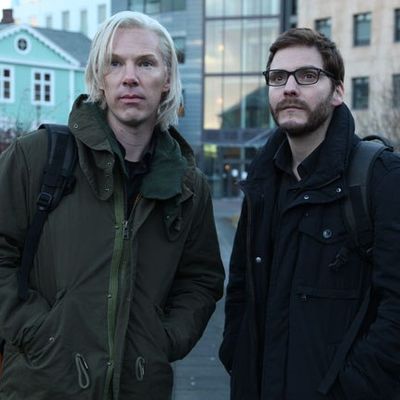
Is WikiLeaks founder Julian Assange a traitor or a visionary? That’s the question posed by the new film The Fifth Estate, which stars Benedict Cumberbatch as Julian Assange, with Daniel Brühl as Assange’s former partner Daniel Domscheit-Berg. We’ve got the film’s brand-new trailer below (due out October 18); we also rang up Fifth Estate director Bill Condon to explain why he cast Cumberbatch, what he makes of the Edward Snowden case, and how he feels about Assange’s claim that the film is a “propaganda attack.”
Let’s talk about that title and tagline first. How did you arrive at The Fifth Estate? And what are we to make of a tagline that implicates the audience, saying, “You are the fifth estate”?
We’re trying very hard to make a movie that raises all the questions without providing all the answers. Even recently, when you saw what happened with the Snowden case, I think it’s hard to come down cleanly on one side because this is all just unbelievably complicated; only by getting involved and understanding the issues can people come to an informed decision of their own. I don’t want to make it sound like a history lesson, but I think the movie does show, in an exciting way, just how complicated these issues are. And the tagline, it has to do with the idea of citizen journalism, the great wild west of the Internet. It’s a true revolution that we’re just coming to terms with.
Assange has called the movie a “serious propaganda attack on WikiLeaks.” Where do you think that sentiment is coming from? Is it because the movie is based in part on a book by Daniel Domscheit-Berg, his former WikiLeaks partner?
That’s where it starts, honestly. He had a tremendous falling-out with Daniel, and they have a real disagreement about events as they occur. Our movie is also based on a book by a Guardian reporter, and Assange took exception to that, too. But you know, he took exception to his own autobiography, which was ghostwritten by a wonderful author — he wouldn’t allow the release of it because it had things that were mildly critical of him. So he’s somebody who doesn’t really take well to presenting any other side. The important thing to know is that I think he’s going to be surprised when he sees the movie, because in no way is it an anti-WikiLeaks movie. It celebrates the idea of WikiLeaks and the tremendous potential of it. It does tell the story of its rise and how it came apart to a certain degree, but it’s also not in any way a movie that intends to malign him, starting with Benedict’s performance: He’s a wonderful actor whose impulse is to understand someone, not to criticize him.
Well, let’s talk about Benedict’s performance, then. You were very ahead of the curve by casting him, since he’s blowing up now after his role in the last Star Trek movie.
I had seen him in movies like War Horse and Tinker Tailor Soldier Spy, but obviously, it was the Holmes performance [in the British show Sherlock] that showed off his incredible virtuosity and ability to capture complicated and ridiculously smart individuals. That made him seem intriguing for this.
His Assange voice is fantastic.
Yeah, it is! That was something that was thrilling to watch. He’s so disciplined, because he was not only taking on that Australian accent but also those strange patterns that Julian. There was a very specific sound of Julian’s that he tried to match, and it was eerie sometimes.
To what extent did you interact with Assange while making the movie?
Not much. It’s a complicated question, but he had been so against the idea of it, given what it was based on. He had gotten a very early draft of the script and went public attacking that. There were contacts — especially an email correspondence that Benedict had started — but it was mostly from his end. He felt very negatively toward the movie, so sadly, there wasn’t anything helpful that was going to come from that direction.
Is Bradley Manning represented in the film?
Yeah, but just barely. Honestly, for just a moment.
I can only imagine what it was like for you when the Edward Snowden story broke. Talk about timing.
Obviously, when you’re making a movie and then editing it, you’re completely inside the story you’re telling, but it was just eerie to watch the events unfold all over again. We have clips of government officials saying things about Assange that are identical to things they’re saying about Snowden! And then the fact that Julian threw himself into that conversation about Snowden was even more surreal, in a way. So watching certain tactics on both sides, it is extraordinary.

